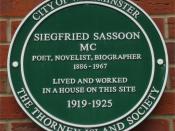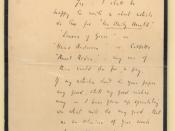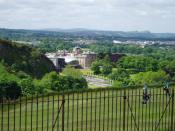Good day ladies and gentlemen and welcome to the Bilinga Youth Literacy Festival, today I will be talking about two of the greatest poems about war, by two of the greatest war poets, Wilfred Owen and Siegfried Sassoon. First I would like to talk a bit about the backgrounds of the two poets so that when I'm finished you may decide whether this poetry is still relevant to modern youth.
The first poet I would like to talk about is Wilfred Owen
Wilfred Owen was born the 18th of March 1893 in Oswestry in the United Kingdom. He was the eldest of four children and brought up at an Anglican school, the influence of his education remains visible in his poems and in their themes: sacrifice, Biblical language, his description of Hell.
He enlisted in the Artists' Rifles on 21st October 1915 and went through 14 months of training in England before he was drafted to France in 1917, the worst war winter.
His total war experience will be rather short: four months, from which only five weeks in the line. On this is based all his war poetry. After battle experience, he went to Craiglockhart War Hospital near Edinburgh.
In August 1918 Owen returned to France. The butchery was ended on 11th November 1918 at 11 o'clock. Seven days before Owen had been killed in one of the last vain battles of this war.
The other poet I would like to talk about is Siegfried Sassoon.
Siegfried Sassoon was born in Weirleigh, Kent, England on September 8, 1886 into a leisurely society of country living.
Sassoon enlisted in the military at the age of 28 just before the draft and was eventually assigned to the Royal Welch Fusiliers
The war was hard on Siegfried and his family.


